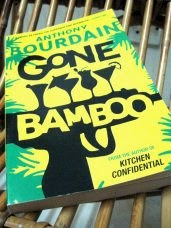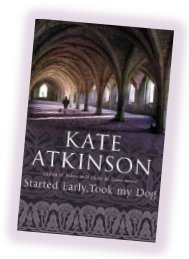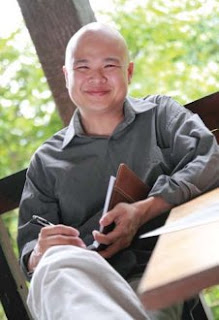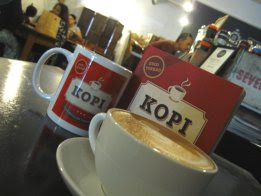Some may have concerns about recycling old stuff for articles, but I think it's fine in some cases, like highlighting good books, for instance.
Since I wrote this unabashedly pimpin'
review, little has changed for the book and the author. And the magazine needed some stuff. So here it is. Meant every damn word, too.
...Never expected it to turn out better than the original review.
Cool running
Jeremy Chin tells Alan Wong that believing in what you do despite the odds is the most important ingredient towards becoming a great writer
first published in the annual issue (2012) of
MPH Quill
2010. The Annexe, Central Market. A curious sight, one of many: Who was this bald, dopey-looking, self-effacing Chinese fellow, selling copies of his début novel,
Fuel? I bought a copy with some degree of trepidation.
Several days afterwards, a friend borrowed the book and finished it before I could turn to page one. The language in
Fuel held her spellbound; its ending made her weep.
Born to run
Fuel’s protagonist, Timothy Malcolm Smith, is the creative whiz at London ad agency Cream. He’s friendly, charitable, deeply spiritual, philosophical, good with the ladies, and keeps virtually no vices. He doesn’t pray to Christ, he
chats with Him, calling him “Jezza” or “Jez”.
There’s this British coffee franchise, Common Grounds, which is older than penicillin, tea bags, even sliced bread. Like bread, however, the brand has gone stale. With his capable and charming assistant Cambria, Timmy swoops in with a plan. The campaign is paradigm-changing. The video ad goes viral. Common Grounds is rescued. One can almost visualise the headlines: “CREAM SAVES COFFEE”.
More ad campaigns follow, including a poem for a charity organisation’s ad that blows everyone away. Rival agencies soon come a-courting, including New York creative powerhouse Oddinary. But, for the time being, he stays put.
And there’s this other dream of his: training in secret since his childhood, Timmy wants to run and win the New York Marathon, taking the entire race by surprise as a dark horse of a champion. No small feat, considering that it means defeating the Ethiopian long-distance running champion, Haile Gebrselassie.
Every phrase, every paragraph has purpose, is strung together well and polished to a showroom sheen.
Did I mention that he’s rich? His self-designed Balinese-style four-bedroom pad,
Ankhura, crowns a 18-floor luxury apartment building on the edge of London’s Canary Wharf. It has a garden and fish-filled rock pools, and a sound system that plays ambient sounds of nature: forests, seaside, rivers and so on. His “elephantine mahogany bed”, larger than king-size, has sheets of 1,500-threadcount Egyptian cotton...
...Whoa. Can such a Mary Sue – whose ads everyone wants to copy, whose artistry can bend the fabric of reality so that
Brits would start switching from tea to
coffee possibly exist? Character, charisma, career, creative chops, cojones, and cash. Timothy Malcolm Smith has it all. Except love, but that’s going to change.
All that was the first 60-odd pages of
Fuel, a dark horse of a Malaysian-authored novel. Even before we enter the posh Balinese home of Timmy Smith, it passed the 50-page test with soaring colours.
What follows is perhaps among the most beautiful love stories ever told. Timmy would share his marathon dreams with Cambria, whom he eventually grows close to. They would train together, go to New York and exchange pleasantries with Gebrselassie. And they would, as the novel promises, do the unexpected. What drives Timmy – the “fuel” for his creativity and his dreams – is passion, hence the title.
Despite the reality-warping powers of Timmy Smith’s creativity and charm, the initial contact, courtship and the clincher is well-scripted and believable, albeit a little rainbow-hued. And the true scope of the Common Grounds ad campaign’s power is left to the reader’s imagination. If the atmosphere of a creative agency feels too true-to-life, it’s because Jeremy Chin himself worked in a similar industry in London for a number of years.
But it’s not just the cover’s simple but impactful design. Every phrase, every paragraph has purpose, is strung together well and polished to a showroom sheen. Timmy’s big empty mahogany bed practically screams, “Lonely heart, space available, enquire within.” No need to guess what the 1,500-threadcount Egyptian cotton sheets imply.
“When you take on a dream this big, it is crucial that you know why you are pursuing it.”—Jeremy Chin
The only minor bumps in Timmy’s racetrack to glory are his intermittent narratives in the first person and the prologue featuring lionesses hunting a gazelle. It makes no sense at first, until one realises that Gebrselassie’s native Ethiopia is home to a number of national parks.
Even before the conclusion of
Fuel, you’re already cheering for Timmy and Cambria. You’ll want to believe that someone like Timmy can exist, that Timmy and Cambria’s love story can be real, that Timmy can win, that he can move mountains. That
you can move mountains, and the fairy-tale Timmy-Cambria romance can be
yours.
Yichalal, as they say in Ethiopia’s Amharic language, a word that summed up Gebrselassie’s gold medal in the 10,000 metres at the 2000 Sydney Olympics, despite being injured. “It is possible.”
Tough track
Jeremy had high hopes for the book: he wants it to become an international best-seller. “When you take on a dream this big, it is crucial that you know why you are pursuing it. And those reasons have to be good reasons, reasons you will hold close to your heart till the day you die,” he told the audience at a special talk and book-reading session for the hearing impaired in 2011. “
Fuel’s success would buy me a golden ticket to continue doing that which I have come to love, which is to write, to share with the world the best that I am capable of. Believing in what you do. That is the most important ingredient towards becoming a great writer.”
He’d quit his job at an ad agency and spent a year to write it, but ran into a number of problems. For one, selling English fiction can be difficult in Malaysia. Also, bookstores worldwide are competing with other forms of entertainment; why read the whole
Lord of the Rings when you can watch or even play it? Kind of funny, when you learn that
Fuel was originally a movie idea. He approached several publishers with the synopsis and three chapters from the manuscript, but was turned down.
Did readers find it hard to relate to the book, which was set in London and New York? For Chin, it was natural; he’d worked for 10 years in the US and two in the UK. Setting the novel in London was important, and the character was supposed to run in the New York City Marathon. “To give
Fuel a Malaysian setting would have been alien,” he stated.
Given the kind of work that went into it, the self-published route was, perhaps, astute. Every word, every phrase was chosen for effect. Each section of the book: characters, milestones, plot, premise and so on, was meticulously mapped out, storyboarded. Chin approached the writing and marketing of
Fuel like an ad campaign.
Sadly, his perfectionist streak and dedication to the book didn’t quite pay off. Not all his supporters bought the book. Glowing reviews of
Fuel did little to spur sales.
“My journey as a writer, as enjoyable as it was, has become extremely difficult now that I’ve gotten to the stage of promoting
Fuel,” said Chin to his audience as he wrapped up the book-reading session. “I’ve walked alone for a year and a half, and it is my sincere hope that each of you here would join me for the next leg of my journey.”
One year later, Chin is still on that journey. He has also released a line of merchandise based on the book’s theme (www.fuelrunning.com). It appears he’s in it for the long run, and still telling naysayers, “
Yichalal”.
It’s hard not to cheer that spirit on.















